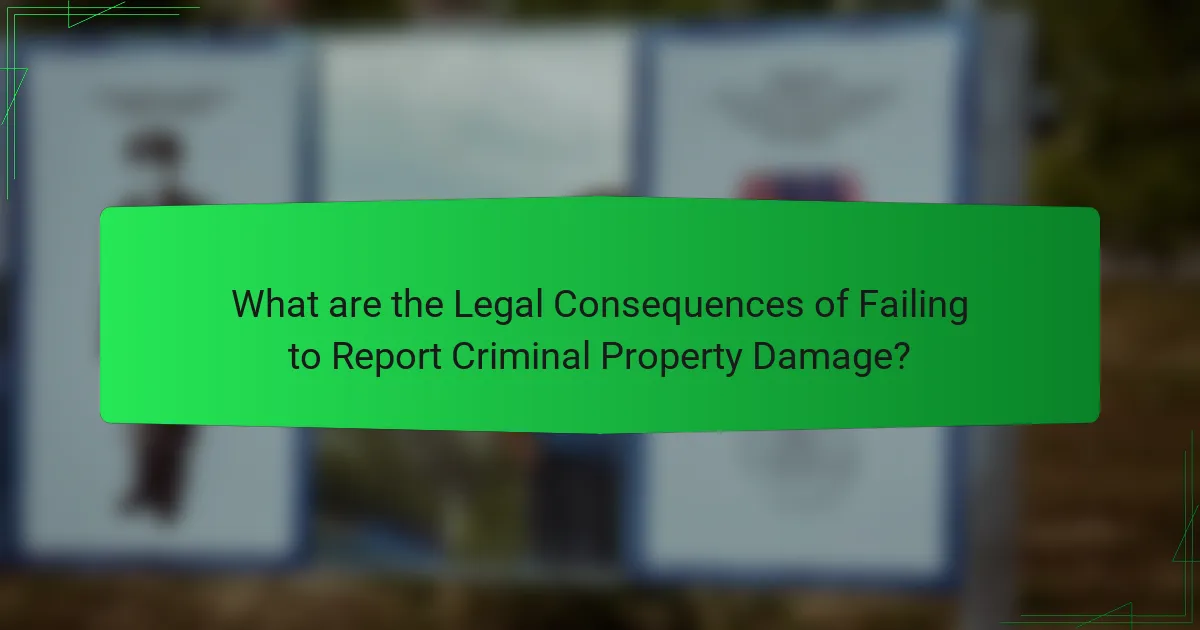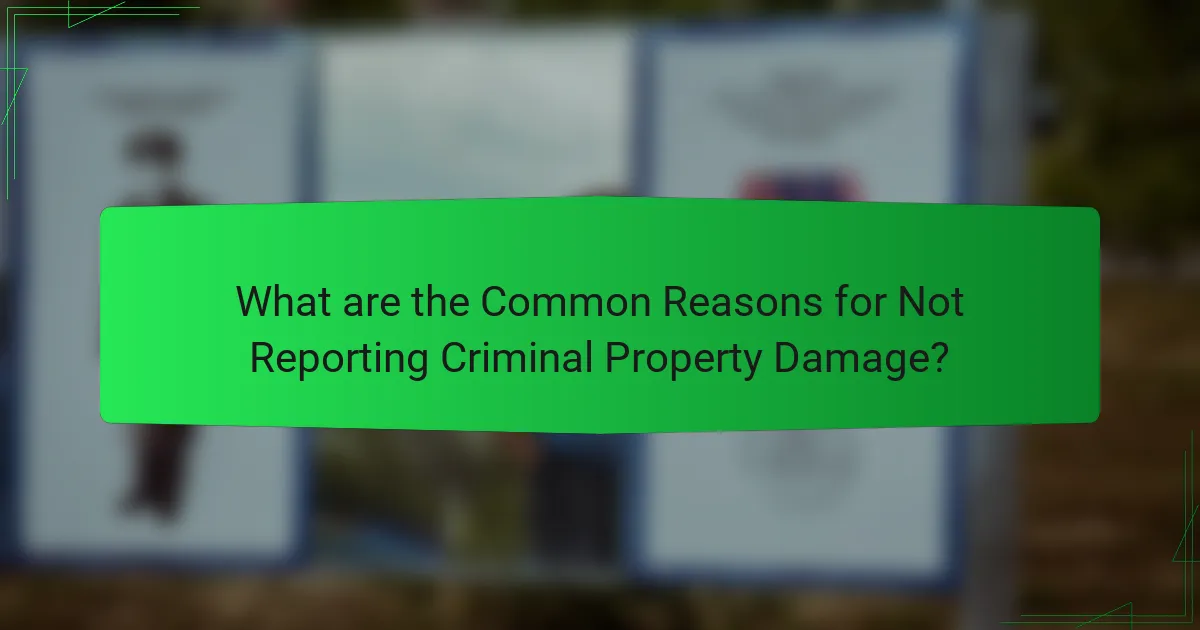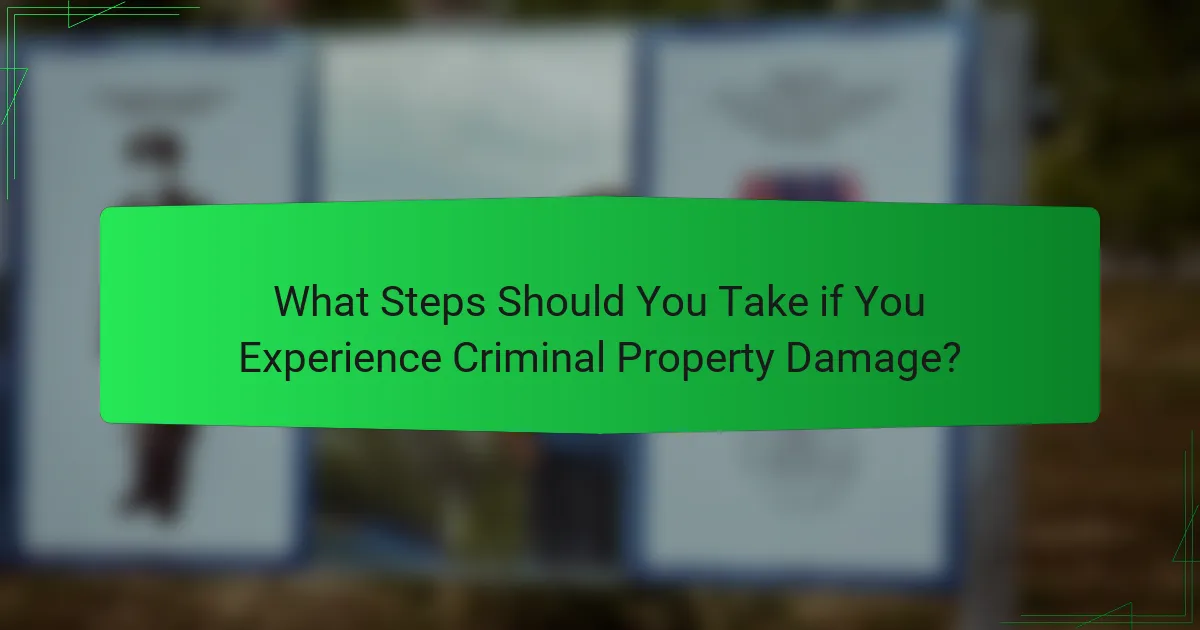Failing to report criminal property damage can result in legal consequences, including fines and potential criminal charges. Individuals are often legally required to report incidents involving vandalism or theft, and non-reporting may be seen as complicity or negligence. Common reasons for not reporting include fear of retaliation, distrust in law enforcement, and a belief that the damage is too minor. It is essential to document the damage, report it to local authorities, and notify insurance companies to ensure proper legal protection and compliance with local laws. Understanding your rights and responsibilities in these situations is crucial to avoid serious penalties.

What are the Legal Consequences of Failing to Report Criminal Property Damage?
Failing to report criminal property damage can lead to legal consequences, including fines and potential criminal charges. In many jurisdictions, individuals are legally obligated to report certain types of property damage, especially if it involves vandalism or theft. Not reporting such incidents can be interpreted as complicity or negligence. Penalties vary by state but may include monetary fines or community service. In severe cases, failure to report can result in misdemeanor or felony charges. Law enforcement may also view non-reporting as an attempt to conceal a crime. Therefore, it is crucial to understand local laws regarding reporting obligations.
How does failing to report criminal property damage affect legal outcomes?
Failing to report criminal property damage can lead to negative legal outcomes. It may hinder law enforcement’s ability to investigate the crime effectively. Without a report, evidence may be lost or degraded over time. Victims may also miss out on potential insurance claims or compensation. In some jurisdictions, failing to report certain crimes can result in legal penalties for the victim. Additionally, it could affect any subsequent legal proceedings, including civil claims. Overall, timely reporting is crucial for preserving legal rights and ensuring accountability.
What penalties can individuals face for not reporting such incidents?
Individuals can face legal penalties for not reporting criminal property damage incidents. These penalties may include fines, which can vary by jurisdiction. In some cases, individuals could face misdemeanor charges. This may lead to potential jail time, depending on the severity and circumstances. Additionally, failure to report may result in civil liability for damages caused. Laws vary widely, so specific penalties depend on local regulations. For instance, some states impose mandatory reporting laws for certain professionals. Failure to comply could lead to disciplinary action within their profession.
How do state laws vary regarding reporting requirements?
State laws vary significantly regarding reporting requirements for criminal property damage. Some states mandate immediate reporting to law enforcement, while others allow a grace period. For instance, California requires victims to report damage within a reasonable timeframe. In contrast, New York emphasizes the necessity of reporting for insurance claims. Additionally, some states impose penalties for failing to report, while others do not. The differences can stem from local statutes and the nature of the crime. Understanding these variances is crucial for compliance and protection of rights.
Why is it important to understand your rights and responsibilities?
Understanding your rights and responsibilities is crucial for navigating legal situations effectively. Knowledge of rights enables individuals to protect themselves from injustice. Awareness of responsibilities ensures compliance with laws, preventing legal repercussions. For instance, failing to report criminal property damage can lead to civil liabilities or criminal charges. Informed individuals are better equipped to make decisions that align with legal standards. This understanding fosters accountability and promotes societal order. Ultimately, it empowers individuals to advocate for their rights while fulfilling their obligations.
What rights do property owners have in these situations?
Property owners have the right to seek compensation for damages caused by criminal activity. This includes the ability to file insurance claims for repairs. Owners may also report incidents to law enforcement to initiate investigations. They can pursue legal action against offenders for recovery of losses. Additionally, property owners have the right to enhance security measures. They may also seek restraining orders against individuals who threaten their property. These rights are supported by laws that protect property ownership and ensure accountability for criminal actions.
How can understanding responsibilities prevent legal issues?
Understanding responsibilities can prevent legal issues by ensuring compliance with laws and regulations. When individuals know their obligations, they are less likely to engage in actions that could lead to legal repercussions. For instance, property owners must report criminal damage to avoid liability for negligence. Failure to report can result in fines or lawsuits. Understanding these responsibilities helps individuals take proactive measures. This awareness can minimize risks associated with legal claims. Legal education and training can further enhance this understanding. Ultimately, informed individuals are better equipped to navigate legal landscapes.

What are the Common Reasons for Not Reporting Criminal Property Damage?
Common reasons for not reporting criminal property damage include fear of retaliation. Victims often worry that reporting may incite further harm. Lack of trust in law enforcement is another reason. Many believe that police will not take their case seriously. Additionally, some individuals feel that the damage is too minor to report. They may think that it does not warrant police involvement. Emotional factors also play a role. Victims may feel embarrassed or ashamed about the incident. Lastly, there may be a lack of awareness regarding the importance of reporting. Many do not understand their legal rights and responsibilities in such situations.
What misconceptions lead to failing to report?
Misconceptions that lead to failing to report include the belief that reporting will not make a difference. Many individuals think authorities will not take action. This belief discourages them from reporting incidents. Another misconception is fear of retaliation from the offender. Victims often worry about personal safety or further victimization. Some people also believe that the incident is too minor to report. This underestimation can prevent necessary legal action. Additionally, individuals may feel unsure about the reporting process. Lack of knowledge on how to report can lead to inaction. Finally, the misconception that they lack evidence can deter individuals from coming forward. These beliefs contribute to underreporting and hinder the pursuit of justice.
How does fear of legal repercussions impact reporting?
Fear of legal repercussions significantly deters individuals from reporting incidents. This fear stems from concerns about potential liability or legal consequences. Many individuals worry that reporting could implicate them in wrongdoing. This apprehension leads to underreporting of crimes, particularly property damage. A study by the Bureau of Justice Statistics indicates that fear of retaliation or legal issues is a primary reason for not reporting crimes. Consequently, this reluctance can hinder law enforcement’s ability to address and resolve criminal activities effectively.
What role does apathy play in not reporting property damage?
Apathy significantly contributes to the underreporting of property damage. Individuals may feel indifferent or unconcerned about the damage, leading to inaction. This lack of urgency can stem from a belief that the damage is minor or unimportant. Research indicates that emotional detachment often results in lower reporting rates. A survey by the National Association of Insurance Commissioners found that 30% of homeowners do not report minor damage due to apathy. Consequently, unreported damage can escalate, leading to more severe issues. This pattern highlights the need for awareness and education on the importance of reporting property damage.
How can awareness of these reasons promote better reporting practices?
Awareness of the reasons behind reporting criminal property damage can enhance reporting practices. Understanding the legal obligations encourages individuals to act promptly. Knowledge of potential penalties for non-reporting motivates compliance. Awareness also fosters a sense of community responsibility. When people recognize the impact of their actions, they are more likely to report incidents. Studies show that informed individuals are more proactive in reporting crimes. For instance, jurisdictions with educational programs see increased reporting rates. This correlation highlights the importance of awareness in improving reporting practices.
What educational resources are available to inform property owners?
Educational resources available to inform property owners include government websites, local housing authorities, and legal aid organizations. These resources provide essential information on property rights and responsibilities. For example, the U.S. Department of Housing and Urban Development (HUD) offers guidelines on property management and tenant rights. Local government websites often include details on reporting criminal property damage. Legal aid organizations provide free consultations and educational materials on legal obligations. Property owner associations can also be valuable, offering workshops and seminars on property management.
How can community initiatives encourage reporting?
Community initiatives can encourage reporting by creating a supportive environment for individuals. They provide education on the importance of reporting criminal property damage. This includes workshops and informational sessions that clarify legal responsibilities. Initiatives can also establish anonymous reporting channels, reducing fear of retaliation. Engaging community leaders fosters trust and encourages participation. Successful initiatives often showcase positive outcomes from reporting, motivating others to act. For instance, studies show that neighborhoods with active reporting campaigns see increased reporting rates. This demonstrates that community involvement directly impacts the willingness to report crimes.

What Steps Should You Take if You Experience Criminal Property Damage?
Document the damage immediately. Take clear photographs of the property damage. This serves as evidence for insurance and legal purposes. Report the incident to local law enforcement. Provide them with all relevant details. Obtain a copy of the police report for your records. Notify your insurance company about the damage. Follow their procedures for filing a claim. Keep records of all communications with authorities and insurers. This documentation is crucial for any future legal proceedings.
What immediate actions should you take after property damage occurs?
Document the damage immediately. Take clear photographs of the affected areas. This serves as evidence for insurance claims. Notify your insurance company as soon as possible. Provide them with all necessary details. Gather any relevant documents, such as receipts or previous reports. If applicable, contact local authorities to report the damage. This step is crucial for legal protection. Ensure you keep records of all communications related to the incident. These steps help safeguard your rights and responsibilities.
How can documenting the damage help your case?
Documenting the damage can significantly strengthen your case in legal proceedings. It provides clear evidence of the extent and nature of the damage. This evidence can support your claims for compensation or restitution. Photographs and written descriptions serve as reliable records. They help establish a timeline of events related to the damage. Documentation can also counter any disputes about the condition of the property. Courts often rely on tangible evidence when making decisions. Comprehensive documentation can improve the likelihood of a favorable outcome in your case.
What information should you gather for a police report?
Gather the following information for a police report: the date and time of the incident. Include the exact location where the incident occurred. Document the names and contact information of any witnesses. Record a detailed description of the events that took place. Note any involved parties, including suspects and victims. Include any physical evidence or property damage observed. If applicable, provide photographs of the scene. Finally, mention any police officers or agencies already contacted regarding the incident. This information ensures a comprehensive report for law enforcement.
What are the best practices for reporting criminal property damage?
Document the damage immediately. Take clear photographs of the affected property. Note the time, date, and location of the incident. Gather witness information if available. Report the damage to local law enforcement promptly. Provide detailed descriptions of the events leading to the damage. Retain a copy of the police report for your records. Follow up with your insurance company to file a claim. These practices ensure accurate reporting and may aid in recovery efforts.
How can you ensure your report is taken seriously?
To ensure your report is taken seriously, provide accurate and detailed information. Clearly state the facts surrounding the incident. Include dates, times, and specific locations. Use objective language to describe events without emotional bias. Support your claims with evidence, such as photographs or witness statements. Follow the appropriate reporting protocols for your jurisdiction. Submit the report to the correct authorities promptly. Proper documentation increases the likelihood of your report being acted upon. According to the National Crime Victimization Survey, detailed reports lead to higher rates of investigation and resolution.
What follow-up actions should you consider after reporting?
After reporting, consider documenting all details of the incident. This includes dates, times, and any communications related to the report. Follow up with the authorities to check on the status of your report. It is important to maintain a record of any case numbers or reference information provided. You should also inform your insurance company if applicable, as they may require documentation. Additionally, seek legal advice if you feel it is necessary. This can help you understand your rights and responsibilities in the situation. Stay informed about any developments related to your report. Timely follow-up actions can ensure that your interests are protected.
What resources are available for individuals facing legal consequences?
Individuals facing legal consequences can access various resources. Legal aid organizations provide free or low-cost legal assistance. Public defenders are available for those who cannot afford a lawyer. Online legal services offer consultations and document preparation. Local bar associations can connect individuals with qualified attorneys. Support groups provide emotional assistance and guidance. Educational resources, such as legal clinics, offer knowledge about rights and responsibilities. Government websites often provide information on legal processes and available services. These resources can help individuals navigate their legal situations effectively.
How can legal counsel assist in navigating these situations?
Legal counsel can assist in navigating situations involving criminal property damage by providing expert legal advice. They help individuals understand their rights and responsibilities under the law. Counsel can guide clients through the complexities of reporting requirements. They clarify potential legal consequences for failing to report such incidents. Legal professionals can also represent clients in communications with law enforcement. They prepare necessary documentation to support a client’s case. Furthermore, counsel can negotiate on behalf of clients to mitigate penalties. Their expertise ensures that clients make informed decisions throughout the process.
What support services can help victims of property damage?
Victims of property damage can access various support services. These include legal aid organizations that provide advice on rights and responsibilities. Insurance companies offer claims assistance and financial support for repairs. Non-profit organizations may provide emergency housing or financial assistance. Local government programs can assist with disaster recovery and property restoration. Community support groups often offer emotional support and resources for victims. Each of these services plays a crucial role in helping victims recover from property damage.
The main entity of this article is the legal consequences of failing to report criminal property damage. The article outlines the legal obligations individuals have regarding reporting incidents of property damage, detailing potential penalties such as fines, misdemeanor charges, and civil liabilities. It emphasizes the importance of understanding local laws, the impact of non-reporting on legal outcomes, and the rights property owners possess in these situations. Additionally, the article addresses common reasons for failing to report, misconceptions that hinder reporting, and the steps individuals should take if they experience property damage, including documentation and communication with law enforcement and insurance companies.